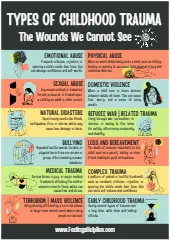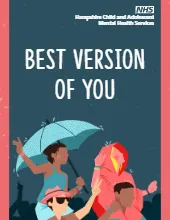 The Types of Childhood Trauma guide is a free, printable PDF resource designed to help parents, carers, teachers, and professionals identify and understand the many forms of trauma a child may experience. Written in clear, accessible language, this educational tool explains both visible and hidden wounds that can deeply affect a child’s emotional, mental, and physical wellbeing.
The Types of Childhood Trauma guide is a free, printable PDF resource designed to help parents, carers, teachers, and professionals identify and understand the many forms of trauma a child may experience. Written in clear, accessible language, this educational tool explains both visible and hidden wounds that can deeply affect a child’s emotional, mental, and physical wellbeing.
The guide outlines common categories of childhood trauma, including:
Physical abuse – deliberate physical harm causing injury or distress
Emotional abuse – constant criticism, rejection, or neglect of emotional needs
Sexual abuse – any sexual contact or behaviour that is forced, pressured, or manipulated
Bullying – repeated harmful behaviour involving a power imbalance
Domestic violence – witnessing violence between adults at home
Loss and bereavement – grief following the death of a loved one
Medical trauma – serious illness, injury, or invasive medical treatments
Natural disasters – experiencing floods, earthquakes, fires, or storms
Refugee and war-related trauma – displacement, persecution, or exposure to violence
Terrorism and mass violence – direct or indirect impact of large-scale violent events
Complex trauma – prolonged exposure to multiple forms of harm
Each section offers straightforward definitions and real-life examples, making it suitable for use with both adults and young people. It’s ideal for:
Schools – PSHE lessons, safeguarding training, and awareness campaigns
Counsellors & therapists – psychoeducation in sessions with children or carers
Social workers & foster carers – placement preparation, life story work, and reviews
Parents & carers – understanding children’s behaviour and emotional needs
By promoting early recognition and compassionate support, this guide helps reduce stigma and encourages healing. It empowers adults to respond to trauma with empathy, ensuring children feel safe, valued, and hopeful.
Download the FREE Types of Childhood Trauma Guide – An essential awareness tool for safeguarding, mental health education, and trauma-informed care. Perfect for anyone supporting a child who has faced difficult life experiences.








